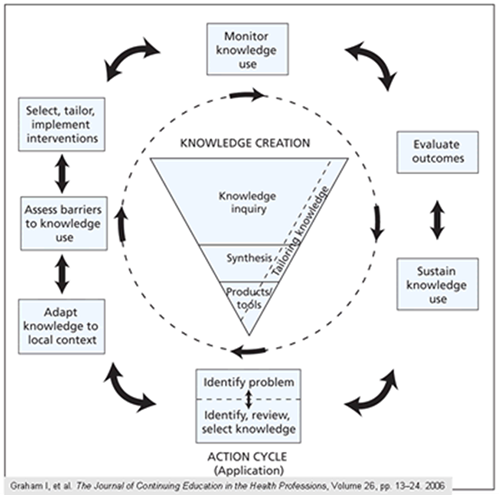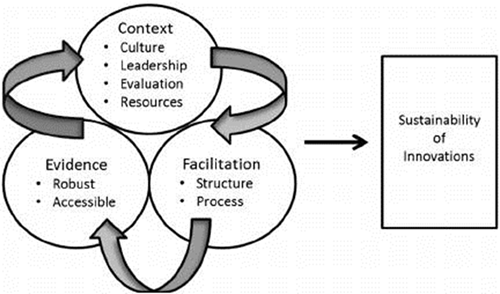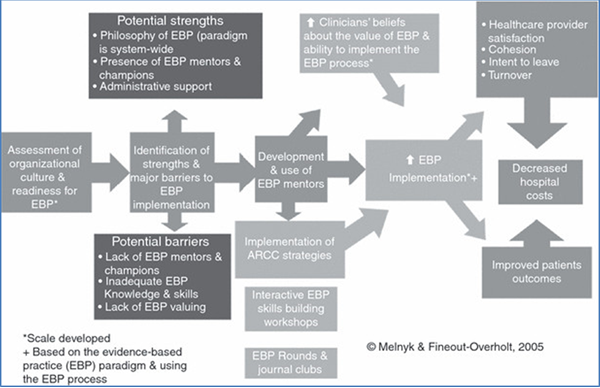Online Course
NDNP 804 - Theory for Evidence-Based Practice
Module 8: Theory, Model or Framework Identification
Evidence-Based Practice Models and Frameworks
An evidence-based practice model or framework that is clear to the clinician and fits the organization will guide a systematic approach to an evidence review and practice change. There are a variety of evidence-based practice models and frameworks that may be useful. This topic will focus on three that emphasize team decision-making. They include the Promoting Action on Research Implementation in Health Services (PARISH) framework, Advancing Research and Clinical Practice Through Close Collaboration (ARCC) model, and the Knowledge to Action (KTA) framework. The evaluation of the model or framework’s usefulness should be used to determine the best fit to the practice setting
Promoting Action on Research Implementation in Health Services (PARISH) Framework
The PARIHS framework has three key elements: the nature of the evidence, the quality of the context of implementation, and appropriate approaches to facilitation. Evidence is described as sources of knowledge as perceived by multiple stakeholders. Context describes the quality of the environment where the project is being implemented. Facilitation is a technique to support others to change in attitude and skills. The success of implementing evidence-based practice and the sustainability of the innovation is dependent upon the strength and appropriateness of these key elements.
Reference:
Rycroft-Malone, J. (2010). Promoting on Research Implementation in Health Services (PARISH). In J. Rycroft-Malone & T. Bucknall (Eds.), Models and frameworks for implementing evidence-based practice: Linking evidence to action (pp. 109-136). Oxford: Wiley-Blackwell.
Advancing Research and Clinical Practice through Close Collaboration (ARCC) Model
The ARCC model focuses on system-wise implementation of evidence-based practice (EBP) and sustainability of EBP to achieve quality outcomes. The model has five steps:
- assessment of culture and organizational readiness for implementation in the healthcare system
- identification of facilitators and barriers of the EBP process in the organization
- identification of EBP mentors
- implementation of the evidence into organizational practice
- evaluation of the outcomes resulting from the practice change
References:
Melnyk, B.M. & Fineout-Overholt, E. (2010). In J. Rycroft-Malone & T. Bucknall, (Eds). Models and frameworks for implementing Evidence-Based Practice: Linking evidence to action. (pp. 169-183). Oxford: Wiley-Blackwell.
Melnyk B.M. & Fineout-Overholt E. (2011) Evidence-based practice in nursing and healthcare: A guide to best practice. (2nd ed.). Philadelphia: Wolters Kluwer.
Knowledge to Action (KTA) Framework
The KTA framework is designed to facilitate knowledge translation through an iterative, multifaceted and dynamic process that enables a deliberate change in practice. The framework includes three phases of knowledge creation: knowledge inquiry, knowledge synthesis, and development of knowledge tools (i.e., practice guidelines, decision-aides or algorithms). Graham and Tetroe (2010) describe this process as a sieve, filtering knowledge in order to make the results more informative for the targeted audience. The KTA framework also incorporates seven action stages:
- identify a problem
- adapt knowledge to the local context
- assess facilitators and barriers to knowledge use
- select, tailor and implement intervention
- monitor knowledge use
- evaluate outcomes
- sustain knowledge use

These action stages can occur consecutively or concurrently and all can influence the knowledge creation phase of the framework.
Reference:
Graham, I. D., & Tetroe, J. M. (2010). The knowledge to action framework. In J. Rycroft-Malone & T. Bucknall (Eds.), Models and frameworks for implementing evidence-based practice: Linking evidence to action (pp. 207-222). Oxford: Wiley-Blackwell
This website is maintained by the University of Maryland School of Nursing (UMSON) Office of Learning Technologies. The UMSON logo and all other contents of this website are the sole property of UMSON and may not be used for any purpose without prior written consent. Links to other websites do not constitute or imply an endorsement of those sites, their content, or their products and services. Please send comments, corrections, and link improvements to nrsonline@umaryland.edu.

